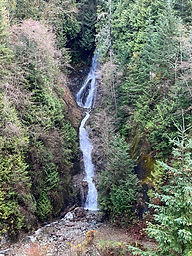Neighbours Pull Together
- kc dyer

- Sep 16, 2025
- 3 min read
Sunset block party combines ivy pull, potluck

In a case of 'many hands make light work' crossed with 'time for a get-together with the neighbours', residents of Sunset Drive met this weekend for a block party ... with a twist.
The twist, of course, was all in the wrist, in the form of a collective ivy-pull before the party began.
Last spring, Butterflyway Rangers Val Morton and Hana Boye, who both live on Sunset Drive, decided they wanted to have a fun gathering, while also encouraging neighbours to help remove some of the invasive ivy on their street.
As added incentive, the duo wanted to give away native plants that neighbours could introduce into their own yards. They obtained a Neighbourhood Small Grant from the West Vancouver Foundation and used it to purchase a collection of native plants from BC’s Wild Heritage Plants Nursery, located near Sardis.
Morton and Boye were pleased to discover that members of fourteen different families along their (comparatively short) street participated, including a group of kids and even one teen. The teen was given a certificate of participation that she can use at school for service hours, as a bonus.
"A hot dog barbecue was set up and everyone brought food to share," said Morton. "We decorated with balloons and streamers, provided pavement chalk for the kiddies, and enjoyed a ‘golden oldies’ playlist while we socialized."
English ivy is on the 'most wanted list' of invasive species in the province, and keen gardeners Boye and Morton are anxious to promote indigenous species over invasive ones.
"According to the Invasive Species Council of BC, invasive species are the second greatest threat to biodiversity after habitat loss," says Morton, noting that these plants first evolved in Europe, and here in BC there are no natural checks on their population growth.
English ivy, in particular, spreads over the ground and creates an impenetrable mat that blocks out native plants that are an essential part of the native web of life. The Invasive Species Council also reports that English ivy grows rapidly and needs very little light or water once it has established, and even grows during the winter. When mature, English ivy climbs trees, where it produces flowers and seeds. These seeds are then spread far and wide by birds. The weight of the ivy on the trees weakens them and makes them susceptible to wind damage.
As we move into autumn, Morton advises local gardeners to ‘leave the leaves’, as they add essential nutrients to the soil and provide habitat for animals.
"The hollow stems of many native plants act as homes for insects over the winter and the seed heads provide food for birds," says Morton. "It's difficult to curb our desire to ’tidy up’, but nature isn’t very tidy and it would be great if we could look at the dried plant stalks as a benefit to the environment, not as a mess."
Boye and Morton recommend woodland or coastal strawberries as native groundcover, since they both spread rapidly and provide delicious little berries for local birds (and humans). And for those looking to retain banks, they suggest trying sword ferns and Oregon grape as an alternative to the invasive ivy.
"One of our goals was to inspire others to work at reducing invasive plants in their own yards," said Morton, who was also hoping to inspire smaller such projects among neighbours in the future. "It’s always more fun to work in a group."

The Watershed values your thoughts. Share your comments below, or email us at editor@lionsbaywatershed.ca
Like what you're reading? For as little as $5/month, you can support local independent journalism by subscribing to The Watershed HERE.








Comments